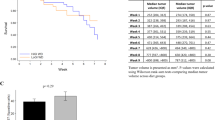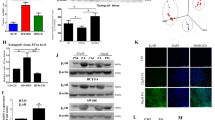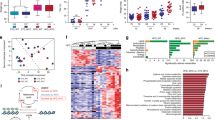Abstract
BACKGROUND:
Previous mouse studies suggest that decreasing dietary fat content can slow prostate cancer (PCa) growth. To our knowledge, no study has yet compared the effect of multiple different fats on PCa progression. We sought to systematically compare the effect of fish oil, olive oil, corn oil and animal fat on PCa progression.
METHODS:
A total of 96 male severe combined immunodeficient mice were injected with LAPC-4 human PCa cells. Two weeks following injection, mice were randomized to a Western diet based on fish oil, olive oil, corn oil or animal fat (35% kilocalories from fat). Animals were euthanized when tumor volumes reached 1000 mm3. Serum was collected at death and assayed for PSA, insulin, insulin-like growth factor-1 (IGF-1), IGF-1-binding protein-3 and prostaglandin E-2 (PGE-2) levels. Tumors were also assayed for PGE-2 and cyclooxygenase-2 levels, and global gene expression was analyzed using Affymetrix microarrays.
RESULTS:
Mice weights and tumor volumes were equivalent across groups at randomization. Overall, fish oil consumption was associated with improved survival relative to other dietary groups (P=0.014). On gene expression analyses, the fish oil group had decreased signal in pathways related to mitochondrial physiology and insulin synthesis/secretion.
CONCLUSIONS:
In this xenograft model, we found that consuming a diet in which fish oil was the only fat source slowed tumor growth and improved survival compared with that in mice consuming diets composed of olive oil, corn oil or animal fat. Although prior studies showed that the amount of fat is important for PCa growth, this study suggests that the type of dietary fat consumed may also be important.
This is a preview of subscription content, access via your institution
Access options
Subscribe to this journal
Receive 4 print issues and online access
We are sorry, but there is no personal subscription option available for your country.
Buy this article
- Purchase on Springer Link
- Instant access to full article PDF
Prices may be subject to local taxes which are calculated during checkout






Similar content being viewed by others
References
Jemal A, Siegel R, Ward E, Hao Y, Xu J, Thun MJ . Cancer statistics, 2009. CA Cancer J Clin 2009; 59: 225–249.
Hsing AW, Tsao L, Devesa SS . International trends and patterns of prostate cancer incidence and mortality. Int J Cancer 2000; 85: 60–67.
Kolonel LN, Nomura AM, Cooney RV . Dietary fat and prostate cancer: current status. J Natl Cancer Inst 1999; 91: 414–428.
Villeneuve PJ, Johnson KC, Kreiger N, Mao Y . Risk factors for prostate cancer: results from the Canadian National Enhanced Cancer Surveillance System. The Canadian Cancer Registries Epidemiology Research Group. Cancer Causes Control 1999; 10: 355–367.
Kolonel LN . Fat, meat, and prostate cancer. Epidemiol Rev 2001; 23: 72–81.
Chan JM, Gann PH, Giovannucci EL . Role of diet in prostate cancer development and progression. J Clin Oncol 2005; 23: 8152–8160.
Clinton SK, Giovannucci E . Diet, nutrition, and prostate cancer. Annu Rev Nutr 1998; 18: 413–440.
Crowe FL, Key TJ, Appleby PN, Travis RC, Overvad K, Jakobsen MU et al. Dietary fat intake and risk of prostate cancer in the European Prospective Investigation into Cancer and Nutrition. Am J Clin Nutr 2008; 87: 1405–1413.
Norrish AE, Skeaff CM, Arribas GL, Sharpe SJ, Jackson RT . Prostate cancer risk and consumption of fish oils: a dietary biomarker-based case–control study. Br J Cancer 1999; 81: 1238–1242.
Terry P, Lichtenstein P, Feychting M, Ahlbom A, Wolk A . Fatty fish consumption and risk of prostate cancer. Lancet 2001; 357: 1764–1766.
Augustsson K, Michaud DS, Rimm EB, Leitzmann MF, Stampfer MJ, Willett WC et al. A prospective study of intake of fish and marine fatty acids and prostate cancer. Cancer Epidemiol Biomarkers Prev 2003; 12: 64–67.
de Lorgeril M, Salen P, Martin JL, Monjaud I, Boucher P, Mamelle N . Mediterranean dietary pattern in a randomized trial: prolonged survival and possible reduced cancer rate. Arch Intern Med 1998; 158: 1181–1187.
Godley PA, Campbell MK, Gallagher P, Martinson FE, Mohler JL, Sandler RS . Biomarkers of essential fatty acid consumption and risk of prostatic carcinoma. Cancer Epidemiol Biomarkers Prev 1996; 5: 889–895.
Mills PK, Beeson WL, Phillips RL, Fraser GE . Cohort study of diet, lifestyle, and prostate cancer in Adventist men. Cancer 1989; 64: 598–604.
Wang Y, Corr JG, Thaler HT, Tao Y, Fair WR, Heston WD . Decreased growth of established human prostate LNCaP tumors in nude mice fed a low-fat diet. J Natl Cancer Inst 1995; 87: 1456–1462.
Ngo TH, Barnard RJ, Anton T, Tran C, Elashoff D, Heber D et al. Effect of isocaloric low-fat diet on prostate cancer xenograft progression to androgen independence. Cancer Res 2004; 64: 1252–1254.
Ngo TH, Barnard RJ, Cohen P, Freedland S, Tran C, deGregorio F et al. Effect of isocaloric low-fat diet on human LAPC-4 prostate cancer xenografts in severe combined immunodeficient mice and the insulin-like growth factor axis. Clin Cancer Res 2003; 9: 2734–2743.
Kobayashi N, Barnard RJ, Henning SM, Elashoff D, Reddy ST, Cohen P et al. Effect of altering dietary omega-6/omega-3 fatty acid ratios on prostate cancer membrane composition, cyclooxygenase-2, and prostaglandin E2. Clin Cancer Res 2006; 12: 4662–4670.
Berquin IM, Min Y, Wu R, Wu J, Perry D, Cline JM et al. Modulation of prostate cancer genetic risk by omega-3 and omega-6 fatty acids. J Clin Invest 2007; 117: 1866–1875.
Freedland SJ, Mavropoulos J, Wang A, Darshan M, Demark-Wahnefried W, Aronson WJ et al. Carbohydrate restriction, prostate cancer growth, and the insulin-like growth factor axis. Prostate 2008; 68: 11–19.
Lloyd JC, Antonelli JA, Phillips TE, Masko EM, Thomas JA, Poulton SH et al. Effect of isocaloric low fat diet on prostate cancer xenograft progression in a hormone deprivation model. J Urol 2010; 183: 1619–1624.
Klein KA, Reiter RE, Redula J, Moradi H, Zhu XL, Brothman AR et al. Progression of metastatic human prostate cancer to androgen independence in immunodeficient SCID mice. Nat Med 1997; 3: 402–408.
Gravina GL, Marampon F, Giusti I, Carosa E, Di Sante S, Ricevuto E et al. Differential effects of PXD101 (belinostat) on androgen-dependent and androgen-independent prostate cancer models. Int J Oncol 2012; 40: 711–720.
Emonds KM, Swinnen JV, Lerut E, Koole M, Mortelmans L, Mottaghy FM . Evaluation of androgen-induced effects on the uptake of [18F]FDG, [11C]choline and [11C]acetate in an androgen-sensitive and androgen-independent prostate cancer xenograft model. EJNMMI Res 2013; 3: 31.
Thomas R, Sharifi N . SOD mimetics: a novel class of androgen receptor inhibitors that suppresses castration-resistant growth of prostate cancer. Mol Cancer Ther 2012; 11: 87–97.
Mukherjee P, Sotnikov AV, Mangian HJ, Zhou JR, Visek WJ, Clinton SK . Energy intake and prostate tumor growth, angiogenesis, and vascular endothelial growth factor expression. J Natl Cancer Inst 1999; 91: 512–523.
Thomas JA 2nd, Antonelli JA, Lloyd JC, Masko EM, Poulton SH, Phillips TE et al. Effect of intermittent fasting on prostate cancer tumor growth in a mouse model. Prostate Cancer Prostatic Dis 2010; 13: 350–355.
Chen JL, Merl D, Peterson CW, Wu J, Liu PY, Yin H et al. Lactic acidosis triggers starvation response with paradoxical induction of TXNIP through MondoA. PLoS Genet 2010; 6: 1–18.
Subramanian A, Tamayo P, Mootha VK, Mukherjee S, Ebert BL, Gillette MA et al. Gene set enrichment analysis: a knowledge-based approach for interpreting genome-wide expression profiles. Proc Natl Acad Sci USA 2005; 102: 15545–15550.
Kolonel LN . Nutrition and prostate cancer. Cancer Causes Control 1996; 7: 83–94.
Lee MM, Wang RT, Hsing AW, Gu FL, Wang T, Spitz M . Case–control study of diet and prostate cancer in China. Cancer Causes Control 1998; 9: 545–552.
Whittemore AS, Kolonel LN, Wu AH, John EM, Gallagher RP, Howe GR et al. Prostate cancer in relation to diet, physical activity, and body size in blacks, whites, and Asians in the United States and Canada. J Natl Cancer Inst 1995; 87: 652–661.
Park SY, Murphy SP, Wilkens LR, Henderson BE, Kolonel LN . Fat and meat intake and prostate cancer risk: the multiethnic cohort study. Int J Cancer 2007; 121: 1339–1345.
Ramon JM, Bou R, Romea S, Alkiza ME, Jacas M, Ribes J et al. Dietary fat intake and prostate cancer risk: a case–control study in Spain. Cancer Causes Control 2000; 11: 679–685.
Trichopoulou A, Lagiou P, Kuper H, Trichopoulos D . Cancer and Mediterranean dietary traditions. Cancer Epidemiol Biomarkers Prev 2000; 9: 869–873.
Aronson WJ, Kobayashi N, Barnard RJ, Henning S, Huang M, Jardack PM et al. Phase II prospective randomized trial of a low-fat diet with fish oil supplementation in men undergoing radical prostatectomy. Cancer Prev Res (Phila) 2011; 4: 2062–2071.
Li Z, Aronson WJ, Arteaga JR, Hong K, Thames G, Henning SM et al. Feasibility of a low-fat/high-fiber diet intervention with soy supplementation in prostate cancer patients after prostatectomy. Eur J Clin Nutr 2008; 62: 526–536.
Connolly JM, Coleman M, Rose DP . Effects of dietary fatty acids on DU145 human prostate cancer cell growth in athymic nude mice. Nutr Cancer 1997; 29: 114–119.
Hardman WE . (n-3) fatty acids and cancer therapy. J Nutr 2004; 134 (Suppl 12): 3427S–3430S.
Needleman P, Raz A, Minkes MS, Ferrendelli JA, Sprecher H . Triene prostaglandins: prostacyclin and thromboxane biosynthesis and unique biological properties. Proc Natl Acad Sci USA 1979; 76: 944–948.
McKeehan WL, Adams PS, Rosser MP . Direct mitogenic effects of insulin, epidermal growth factor, glucocorticoid, cholera toxin, unknown pituitary factors and possibly prolactin, but not androgen, on normal rat prostate epithelial cells in serum-free, primary cell culture. Cancer Res 1984; 44: 1998–2010.
Hsing AW, Chua S Jr, Gao YT, Gentzschein E, Chang L, Deng J et al. Prostate cancer risk and serum levels of insulin and leptin: a population-based study. J Natl Cancer Inst 2001; 93: 783–789.
Lubik AA, Gunter JH, Hendy SC, Locke JA, Adomat HH, Thompson V et al. Insulin increases de novo steroidogenesis in prostate cancer cells. Cancer Res 2011; 71: 5754–5764.
Armstrong P, Kelley DS, Newman JW, Staggers FE Sr, Hartiala J, Allayee H et al. Arachidonate 5-lipoxygenase gene variants affect response to fish oil supplementation by healthy African Americans. J Nutr 2012; 142: 1417–1428.
Calle EE, Rodriguez C, Walker-Thurmond K, Thun MJ . Overweight, obesity, and mortality from cancer in a prospectively studied cohort of U.S. adults. N Engl J Med 2003; 348: 1625–1638.
Whitley BM, Moreira DM, Thomas JA, Aronson WJ, Terris MK, Presti JC Jr et al. Preoperative weight change and risk of adverse outcome following radical prostatectomy: results from the Shared Equal Access Regional Cancer Hospital database. Prostate Cancer Prostatic Dis 2011; 14: 361–366.
Acknowledgements
We would like to acknowledge the contributions of Jodi Antonelli, Jean-Alfred Thomas II and Tameika E Phillips. This study was supported by the Department of Veterans Affairs; Division of Urology, Department of Surgery, Duke University; Prostate Cancer Foundation; NIH Training Grant 1 TL1 RR024126; and NIH 5R01 CA131235-03.
Author information
Authors and Affiliations
Corresponding author
Ethics declarations
Competing interests
The authors declare no conflict of interest.
Additional information
Supplementary Information accompanies the paper on the Prostate Cancer and Prostatic Diseases website .
Supplementary information
Rights and permissions
About this article
Cite this article
Lloyd, J., Masko, E., Wu, C. et al. Fish oil slows prostate cancer xenograft growth relative to other dietary fats and is associated with decreased mitochondrial and insulin pathway gene expression. Prostate Cancer Prostatic Dis 16, 285–291 (2013). https://doi.org/10.1038/pcan.2013.19
Received:
Revised:
Accepted:
Published:
Issue Date:
DOI: https://doi.org/10.1038/pcan.2013.19
Keywords
This article is cited by
-
Effect of omega-3 fatty acid diet on prostate cancer progression and cholesterol efflux in tumor-associated macrophages—dependence on GPR120
Prostate Cancer and Prostatic Diseases (2023)
-
Application of metal-organic skeletons and cellulose composites in nanomedicine
Cellulose (2023)
-
Effects of dietary omega-3 fatty acids on orthotopic prostate cancer progression, tumor associated macrophages, angiogenesis and T-cell activation—dependence on GPR120
Prostate Cancer and Prostatic Diseases (2022)
-
Effect of dietary omega-3 fatty acids on castrate-resistant prostate cancer and tumor-associated macrophages
Prostate Cancer and Prostatic Diseases (2020)
-
Body size and dietary risk factors for aggressive prostate cancer: a case–control study
Cancer Causes & Control (2019)



